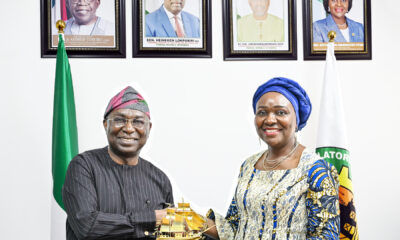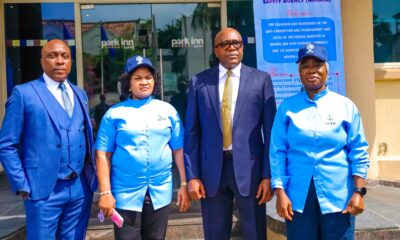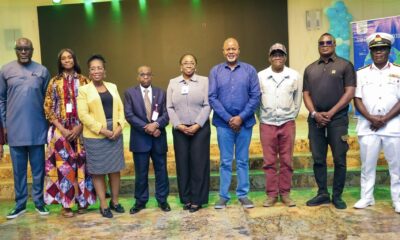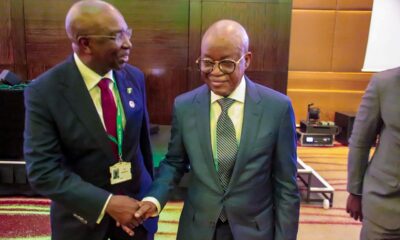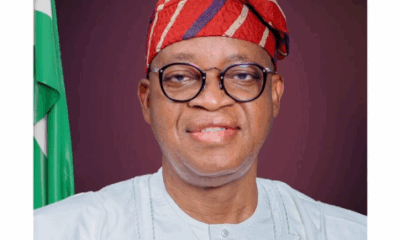Analysis
NIMASA’s Aggressive Campaign Against War Risk Premiums: Time for Action or Rhetoric?

BY ALEX AKAO
In maritime parlance, War Risk Insurance Premium (WRIP) refers to additional insurance charges paid by shipowners or charterers to cover risks associated with operating in areas affected by war conflicts, piracy, terrorism, or civil unrest.
Simply put, WRI provides coverage for losses or damages to vessels, cargo and crew due to war related events that are excluded from standard marine insurance policies. The premium therefore refers to the amount paid for this extra coverage.
Over the years, Nigeria has been the butt of international humiliation over the incessant carnages and insecurity challenges, particularly at the Gulf of Guinea (GoG), for which it has had to pay hugely for such seaborne infractions.
However, the security situation along the hitherto dreaded GoG has since subsided if not completely eradicated, due to the concerted efforts of the Nigerian government’s concerned agencies in collaboration with stakeholders who largely bore the brunt of such prohibitive WIP charges.
Thus for years, the justification for WRI on Nigerian-bound cargo stemmed from the very real threat of piracy and Niger Delta militancy. However, as confirmed by the International Maritime Bureau (IMB) in 2021, Nigeria has been officially removed from the list of piracy-prone countries.
The International Bargaining Forum (IBF) further validated this progress in 2023, delisting Nigeria from high-risk maritime nations.
The Minister of Marine and Blue Economy, Adegboyega Oyetola, has also repeatedly affirmed that there hasn’t been a single pirate incident in Nigerian waters for over three years, attributing this peace to the multi-billion naira Deep Blue Project spearheaded by NIMASA.
Despite all the validation by the local as well as the international bodies giving Nigeria a clean bill of health on account of the GoG, charges accruing to millions of dollars annually as WRIP charges has continued to be slammed on Nigeria.
The persistent drain of WRI on the Nigerian economy is estimated at a staggering $500 million annually. This is an international affront that demands immediate and decisive action.
While the Nigerian Maritime Administration and Safety Agency (NIMASA) claims to be aggressively campaigning against this fraud, the Maritime Reporters Association of Nigeria (MARAN), through its upcoming 3rd Annual Maritime Lecture (MAMAL 2025), is poised to expose the bitter truth and champion the cause of Nigerian stakeholders.
Despite the apex agency’s discussions with international partners and promises to take the matter to the United Nations, the financial hemorrhaging continues unabated.
While the Nigerian Maritime Administration and Safety Agency (NIMASA) under its Director General, Dr. Dayo Mobereola, has stated its commitment to eliminating the exorbitant and unjustifiable War Risk Insurance (WRI) premiums imposed by foreign insurance firms on Nigerian remains ceaseless.
Thus, shipowners and importers, who bear the brunt of these unjustifiable premiums, are left wondering why a nation with demonstrably secure waters is still being treated as a war zone by the international shipping community.

Alhaji Aminu Umar, Managing Director of Sea Transport Services Nigeria Limited and President of the Nigerian Chamber of Shipping, rightly points out the need for NIMASA to engage the Joint War Committee, the body responsible for waiving or imposing WRI.
However, despite their efforts, the WRI remains firmly in place, raising concerns about the agency’s effectiveness in truly challenging this “deeply entrenched international politics”, as described by the President of the Nigeria Shipowners Association (NISA), Mr. Sola Adewunmi.
It is bewildering that foreign insurance companies like Lloyd’s of London and its allie P&I clubs continue to levy these war risk surcharges, apparently due to seemingly ineffective intervention by NIMASA or for what insiders attributed to possible conivance.
This isn’t just an inconvenience; it’s a monumental financial drain. In the past three years alone, Nigeria has coughed up an eye-watering $1.5 billion in WRI premiums. To put this into perspective, a Very Large Crude Carrier (VLCC) can incur a WRI surcharge of approximately $445,000 per voyage, while a new container vessel might face a hefty $525,000.
Shipping giants like Maersk even tack on additional “transit disruption surcharges” of up to $450 per container.
This translates directly to higher costs for Nigerian importers and exporters who ultimately pass on the brunt to the ordinary citizen, who pays inflated prices for goods.
Against this backdrop of frustration and economic detriment, the Maritime Reporters Association of Nigeria (MARAN) is taking decisive action.
Their 3rd Annual Maritime Lecture (MAMAL 2025), of the industry watchdogs slated for August 28, 2025, at the Eko Hotel and Suites in Lagos, is set to be a groundbreaking event that directly confronts this international fraud.
With the theme “Addressing the Burden of War Risk Insurance on Nigerian Maritime Trade,” MAMAL 2025 aims to be more than just a discussion forum. It’s a rallying cry to the Federal Government and all affected stakeholders to acknowledge the severe economic implications of these unjust charges.
MARAN President, Mr. Godfrey Bivbere, has unequivocally condemned WRI as an international fraud burdening the economy of Nigeria and other developing countries in the Gulf of Guinea.
MAMAL 2025 promises to dissect every facet of this issue, from the perceived threats to the profound implications of persistent Extra War Risk Insurance (EWRI). It will scrutinize the roles of classification societies like Lloyd’s of London and critically examine the contributions of core stakeholders, including NIMASA, the Nigerian Navy, and other maritime and security operators.
Crucially, MAMAL 2025 will draw over 500 key stakeholders, including maritime security experts, shipowners, terminal operators, international shipping lines, diplomats, insurers, regulators, and legal experts.
This broad engagement, driven by MARAN’s respected voice in the industry, offers a genuine opportunity for a united front against this exploitative practice.
While NIMASA talks to the UN, MARAN is bringing together the very people and organizations directly impacted, creating a platform for collective action and a more forceful demand for change.
The continued imposition of War Risk Insurance on Nigerian-bound vessels is an affront to the nation’s efforts in securing its maritime domain and a significant impediment to its economic growth. It’s time for a definitive resolution, and MAMAL 2025, driven by the persistent advocacy of MARAN, appears to be the most promising avenue for achieving it.

